When the Rohingya crisis becomes an opportunity for some
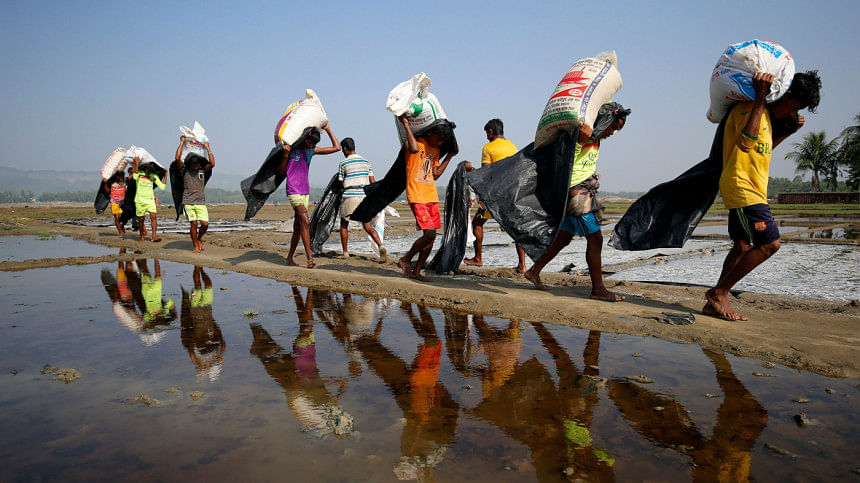
Nearly eight years into exile, the wounds of the Rohingya people remain raw, bleeding silently in the margins of a distracted world. More than a million Rohingya refugees continue to live in limbo, scattered across camps in Bangladesh and beyond, with no clear path home, no recognition of citizenship, and no justice for the atrocities committed against them. In this prolonged state of dispossession and despair, a new and unsettling pattern has taken root: for some in the Rohingya diaspora, the crisis has become not just a cause but a career.
What began as a desperate cry for help has, in some quarters, become a pathway to power. Organisations have sprung up, declarations are made, Zoom calls conducted, and grants are secured. But behind the polished websites and international conferences lies a haunting question: what has changed for those still trapped behind barbed wire in Cox's Bazar?
There is no denying that the Rohingya crisis is one of the gravest tragedies of our time. Following decades of systemic marginalisation, including the 1982 Citizenship Law that stripped Rohingya of legal status, and brutal military operations such as Operation Dragon King (1977) and the 2017 clearance campaign, over a million Rohingya were violently expelled from Myanmar. Despite the passage of time, they remain stateless and voiceless.
While the Myanmar junta escalates its war on ethnic minorities and the world shifts its attention to Ukraine, Gaza, Israel, Syria, and Sudan, Rohingya suffering continues in near-total neglect. Camps have become sprawling slums, rife with violence, drug trafficking, gender-based abuse, and depression. There is no right to work, no real education, no freedom of movement, and little hope.
Yet in the vacuum of progress, a parallel reality has emerged: a new class of diaspora activists, NGO projects, international speakers, and self-declared representatives now speak on behalf of the Rohingya people. They appear at summits, publish op-eds, and secure fellowships. Some hold advisory positions in the NUG, direct civil society forums, or work as policy consultants in Western think tanks.
Diaspora voices are important. But the problem is one of authenticity, accountability, and impact. What too often emerges is not leadership rooted in community, but performance tailored for international consumption. Instead of lifting their people, some have learned how to profit from their pain.
In Cox's Bazar, most refugees have never heard of the diaspora organisations speaking in their name. There is no democratic process of selection, no grassroots mandate. Many in the diaspora have assumed roles of authority based on English fluency, networking skills, and donor access—not lived experience or genuine connection to the communities they claim to lead.
This phenomenon is not unique. In the Syrian, Palestinian, and Afghan diasporas, similar patterns have emerged: trauma becomes a commodity, tragedy becomes a tool, and suffering becomes a platform. As Palestinian academic Hanan Ashrawi once warned, "You cannot commodify your struggle." And yet, in the Rohingya context, commodification is well underway.
In many cases, diaspora activists are quick to criticise those who speak out from the camps. They dismiss dissent as "divisive" and genuine local leaders as "uninformed." Meetings are held in Geneva and New York without ever consulting those in Teknaf or Kutupalong. Stories shared are often from 2017 or before, because many are no longer connected to the evolving horrors on the ground.
The hypocrisy is evident. When Myanmar's military commits atrocities, or when Rohingya in camps are harassed by locals, many diaspora leaders fall silent. But when a young refugee misspeaks, or when internal camp politics become messy, they are quick to post condemnations. Calling out the real oppressors may threaten donor relationships or diplomatic standing; criticising the vulnerable is safe and performative.
Many Rohingya in exile now hold multiple titles—serving as "advisor," "coordinator," "founder," and "spokesperson" in overlapping NGOs. Some attend more conferences than community visits. A few boast of being in seven to ten organisations simultaneously. They are more loyal to their social media bios than to the liberation of their people. Meanwhile, the reality in Arakan worsens, and those in the camps remain in generational limbo.
What is lost in this spectacle is the essence of the Rohingya struggle. This is not just a refugee crisis—it is a struggle for identity, dignity, and justice. The denial of "Rohingya" as a legitimate ethnic group is not semantics; it is genocide by erasure. The junta continues to refer to Rohingya as "illegal Bengali migrants," and even the most celebrated democratic forces like Aung San Suu Kyi have refused to recognise their name, instead defending the junta.
A heartbreaking reality is how fear, trauma, and a lack of direction have shaped youth in the refugee camps. Many educated Rohingya spend their lives teaching in community centres, managing small NGOs, or posting on Facebook—yet rarely take tangible steps toward change. Some blame leaders, some retreat into apathy, and others remain paralysed by the weight of generational oppression.
But silence is not safety, it is slow suicide. Waiting endlessly for the diaspora or the international community to act is a luxury the Rohingya can no longer afford. We must shift from expectation to action, from storytelling to strategy.
There is a quiet betrayal happening, a betrayal from within. Some Rohingya have used their people's pain to build platforms, apply for grants, and create careers. They speak of liberation, but fear discomfort. They champion justice, but avoid risk. They build brands, not bridges. Theirs is an activism of résumés and press photos, not of sacrifice and solidarity.
As Nelson Mandela once said, "Where globalisation means, as it so often does, that the rich and powerful now have new means to further enrich and empower themselves... we have a responsibility to protest in the name of universal freedom." That protest must also be against those who co-opt liberation movements for personal gain.
This is not a rejection of the diaspora—it is a demand for ethical leadership. We need transparent, community-based advocacy; inclusion of refugee voices in decision-making; ground-up strategies, not top-down agendas; a focus on citizenship, repatriation, and safety—not just visibility; and accountability for those who claim to lead.
International donors must be vigilant. The media must look beyond curated stories. And, most importantly, the Rohingya people must reclaim their struggle—from the camps, from Arakan, and, yes, even from opportunists within their own ranks.
This is not cynicism. It is a cry, of a Rohingya man who believed in Mandela, Che Guevara, Malcolm X, and thought his people had heroes too. It is a cry of betrayal. Of stolen hope. Of representation turned into illusion. The Rohingya don't need saviours. They need comrades. Organisers, not opportunists. Fighters, not fundraisers. Bridges, not business cards.
We are near to Arakan. We are near to freedom. But only if we reclaim our struggle and purify our purpose. Let that be the path forward.
Ahtaram Shin is a Rohingya writer and freelancer. He works with Rohingyatographer as an editor and researcher and contributes to various media outlets covering Rohingya issues.
Views expressed in this article are the author's own.
Follow The Daily Star Opinion on Facebook for the latest opinions, commentaries, and analyses by experts and professionals. To contribute your article or letter to The Daily Star Opinion, see our submission guidelines.

 For all latest news, follow The Daily Star's Google News channel.
For all latest news, follow The Daily Star's Google News channel. 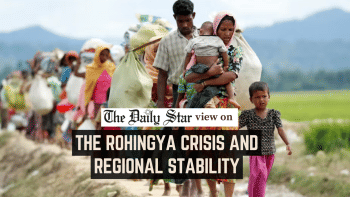





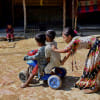
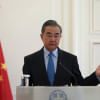
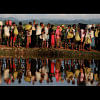


Comments